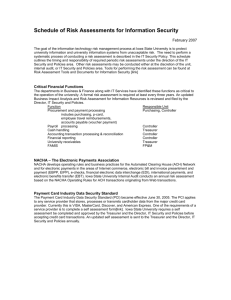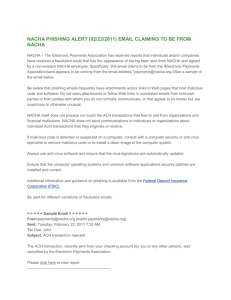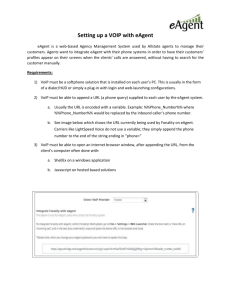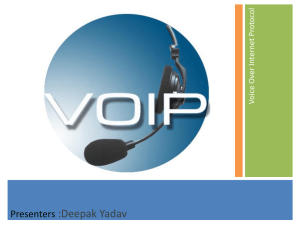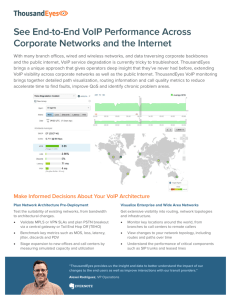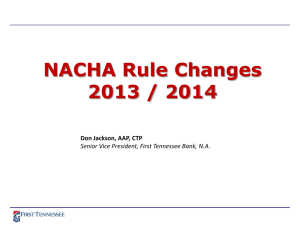PowerPoint - NIC Systems Group, Inc.
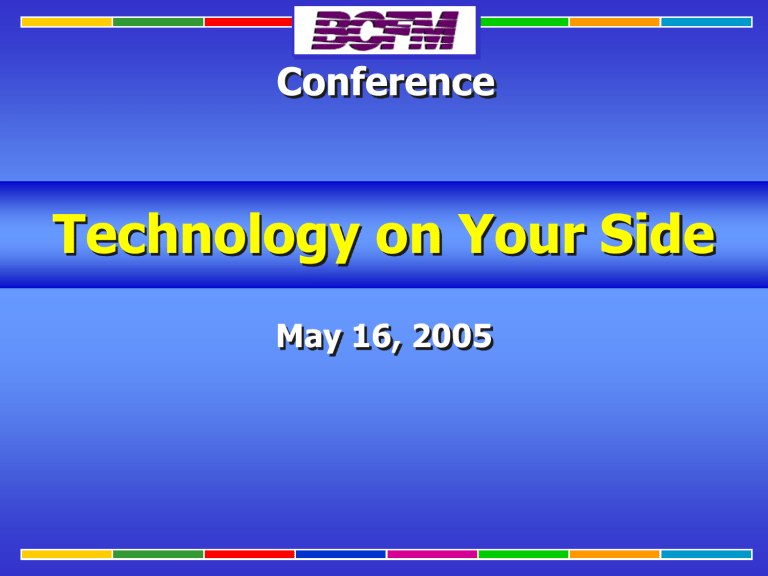
Conference
Technology on Your Side
May 16, 2005
Conference
Desktop Technology
Patrick Kremer
Chief Technology Officer
NIC Systems Group, Chicago
Agenda
Remote Desktop
And
Voice Over IP
Terminal Services
Gives user remote access to Windows
Single location to install software
Low Bandwidth
Any version of Windows from Win95
Hardware Requirements
Re-use older hardware
PIII 900mHz with 1GB RAM can easily support 50 users
Software Licensing
Windows Server 2003 Standard retails for
$699
Per device licensing = one license for each computer - appropriate for university
Per user licensing = one license for each user - appropriate for business
Software Licensing
Terminal Server licenses $79-$129 each
Microsoft Office uses per-device licensing
Telecommuter must have one license for work, and one for home
Business traveler needs only single license for their laptop
Cost Savings
Gas and Maintenance – 1-day-per week telecommuter = 20% savings
Time – 4.3% of New Yorkers commute more than 90 minutes each way
Illness – Avoid costly spread of cold/flu
Cost Savings
Invest your support time into highavailability server-based solutions
Leverage existing PC hardware
Keep software in-house
Reduce onsite support costs
Thin Client
Alternative to a PC
Network Card, Keyboard, Mouse, Monitor
Cost as little as $299
Can be deployed at employee’s home, or even as primary workstation
Thin Client Cost Savings
Very reliable – few components to fail
No need to support a local PC
Watchguard IT worker survey: 40% > 1 hour on remote support. 23% > 2 hours.
For a $45,000/year employee, $11,000 spent on the phone
VoIP
Glossary
DID = Direct Inbound Dial
ITSP = Internet Telephony Service Provider
PBX = Private Branch Exchange
POTS = Plain Old Telephone Service
PSTN = Public Switched Telephone Network
VoIP = Voice Over IP
VoIP
VoIP uses the Internet to place calls
ITSP = ITSP connects VoIP with PSTN
VoIP phone looks like regular phone
Cisco 7960 IP Phone
Telephone Bandwidth
Regular POTS line = 8K of bandwidth
T1 line for telephone = 24 x 8K, plus 1 x 1K
T1 line for internet = 24 x 8K + 1K = 193K
VoIP call takes only 3-4K. This effectively doubles your call capacity.
Asterisk PBX
VoIP PBX system is called Asterisk
Asterisk is free and runs on standard PC
Asterisk is easily expandable
You can run a hybrid VoIP-POTS system with Asterisk
Automated Attendant
Comprehensive Call Activity Reporting
Conference Call Bridging
Call Queueing
Call Routing
Call Snooping
Music on Hold / Transfer
Voicemail
`
VoIP Expenses
Must pay for both inbound and outbound calls to PSTN
Rates vary from $0.012 to $0.039 per minute
VoIP to VoIP calls are FREE
VoIP Example
Broadcast group of 20 stations
$500/month in long distance calls between home office and station
$500/month * 20 stations * 12 months =
$120,000 dollars per year
Conference Calling
Use Asterisk for conference bridging
Call-in rates – free on your hard lines,
$0.012 to $0.039 per minute with VoIP DID
Remote Telephone
Telecommuter or traveler can connect to
Asterisk server
Seamless integration, as if user is at their desk
VoIP In Production
Motorola’s Deer Park Campus – 100% VoIP
The slides and text for this presentation will be available at http://www.nicsys.net
Conference
Paperless Transactions
Linda Bradfield
President & CEO
Southern Financial Exchange, New Orleans
Southern Financial Exchange
Not-for-profit Regional Payments Association
Here to Inform, Not to Sell
Member of NACHA, The Electronic Payments
Association
Paperless Financial Transactions via
The ACH System
Automated Clearing House
An Electronic method of moving funds
A Batch processing system
A rapidly growing payment system
ACH Overview
THE ACH ADVANTAGE
Quick
Accurate
Secure Collection
Secure Payment
KEY BENEFITS OF ACH
PAYMENTS
Cost Reduction
Customer/Trading
Partner Retention
Revenue Opportunities
Value-Added Services for
Customers
Paper Reduction
- Check
- Receipts
- Deposit Slips
The ACH System
For Over 30 Years: Tested, Proven, It works!
Replaces Paper Checks
Set of Rules and Formats Allowing the Exchange of Transactions
ACH transactions (electronic)
Debit (charge) or Credit (deposit)
Large or small dollar amounts
Checking, Savings, Sharedraft, Loan & General Ledger accounts
Consumer, Corporate or Government Agency
The ACH System
What is an ACH?
- Electronic Transaction, Debit or Credit,
Checking or Savings,
Consumer / Corporate
Commercial /
Government
-
Recurring or One-time payment
-
- Authorized
What is not an ACH?
- PREAUTHORIZED
PAPER DRAFT ITEM
(actual paper is received by financial institution)
- Wire Transfers
- POS transactions (card)
- Credit Card
- Debit Card (check cards)
Why Do Businesses Want To Originate
Consumer Payments?
Enhance customer/employee service
Increase customer/employee satisfaction
Reduce processing costs
Improve cash flow
Become more efficient
Eliminate/reduce check reconciliation
Convert to a more secure payment than checks
Consumer versus Corporate
Consumer
Payroll
Retirement
Dividend
Interest
Annuity Payments
Educational Benefit
Reimbursements
Corporate
Cash Concentration
Cash Disbursement
Corporate Trade
Payments
State and Federal Tax
Payments
Financial Electronic Data
Interchange (EDI)
Common Payment Applications -
Corporate
Cash Concentration or Disbursement (CCD)
A debit or credit entry initiated by an organization to consolidate funds of that organization or to fund outlying accounts.
Corporate Trade Exchange (CTX)
An automated corporate payment used to transmit information formatted in ANSI X12 or in UN/EDIFACT syntax in the attached addenda records.
Customer-Initiated Entries (CIE)
An automated consumer transaction that allows consumers to originate an ACH bill payment through their financial institution or a third party bill payment service.
Corporate Cross Border Entry (CBR)
A credit or debit entry initiated to effect a payment exchanged between payment system participants of different countries.
CASH CONCENTRATION AND
DISBURSEMENT BENEFITS
Originator/Receiver/Company
• Leverage Use of Cash Funds
• Assurance of Collected Funds
• Better Investment Opportunities
• Funds Availability From Outlying Locations
- Within 24 hours
• Automatic Transactions Convenience
• Reduces Wire Transfers & Related Expense
ACH ORIGINATION SERVICES:
Ask Your Financial Institution or RPA for Further Details
Direct Credits(PPD): Payments to consumers
Direct Debits (PPD): Recurring fees.
Cash Concentration or Disbursement (CCD)
Corporate Payments (CTX)
Re-Presented Checks (RCK)
Point-of-Purchase (POP)
Internet-Initiated Entries (WEB)
Telephone-Initiated Entries (TEL)
Accounts Receivable Entries (ARC)
Electronic Data Interchange (EDI)
EFTPS: Electronic Federal Tax payment system
2003 – A Banner Year
Electronic Payments Exceeded Checks
60.0
55.0
50.0
45.0
40.0
35.0
30.0
Checks
Electronic
Payments
Compiled by NACHA; Sources - NACHA, Federal Reserve, ATM & Debit News, CHIPS
ACH – Highlights of 2004
2004
Transaction Volume 9.1
(does not include on-us volumes)
Compiled by NACHA; Sources - NACHA, Federal Reserve
2003
7.5 billion
Growth
21.2%
Type of Transaction
Volume
Types of ACH Payments*
2004
Direct Deposit
Direct Payment
B2B
E-check
Volume
(Billions)
3.4
2.2
2.1
2.0
Growth
6.4%
8.6%
13.9%
111%
*does not include on-us volumes
Compiled by NACHA; Sources - NACHA, Federal Reserve
Looking Ahead:
Estimated Check Volume - 2000-2010
44
39
34
29
24
2000 2001 2002 2003 2004 2005 2006 2007 2008 2009 2010
2% Decline 4% Decline 6% Decline
Compiled by NACHA; Sources - NACHA, Federal Reserve
Where To Go From Here
Visit http://www.nacha.org/Memberships/RPA/rpa.htm
or http://www.nacha.org/map/nacha_map.html
to Locate
Your Regional Payments Association
Inquire About Affiliate Membership to Stay
Informed and Receive Assistance
Or Contact the SFE Office At:
(800) 626-4733 or locally in New Orleans
525-6779 Ext. 24
Conference
Webcasting
Perry Shelman
Managing Partner
Stream 57, New York
Conference
